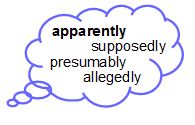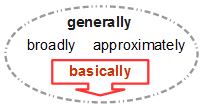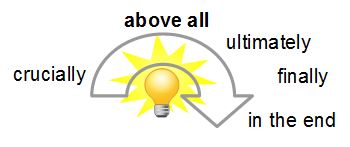Modifiers - quality
Some modifiers tell us about the type or quality or nature of the ideas that they introduce. For instance, if we say that something is 'generally true', we mean something different than if we say that something is 'particularly true'.
These 'quality modifiers' are used a great deal in intellectual discourse at any level, and they can often pass more or less unperceived. However, in fact, they perform two significant functions :-
- they change how we perceive the ideas that they introduce - e.g. adding emphasis or importance, or reducing credibility
- they may link or relate ideas, by comparing or contrasting how we should view them, thus providing overall structure
I present the words in two groups below. This is partly for convenience and clarity of exposition, but more significantly because it seems to me that the two groups reflect two significant modes of thought - which should in turn help the students to use the modifiers more appropriately and skilfully.
.
.
What is really happening ?
.
'should' versus 'is'
We can look at ideas which should be true - but we should never ignore that which is true
.

.
.
We can learn lots of theories - but it may be that these theories are not completely true or accurate ... as we learn when we try to put them into practice and discover that they don't quite fit the real world!
Also, just because a lot of people think something is true doesn't mean that it actually is true. In addition, what we think when we see part of the evidence may turn out to be wrong when we see all of the evidence.
Let's look at each of these mini-groups in more detail ...
**
 These modifiers are very often used together, to contrast what ought to happen with what actually does happen.
These modifiers are very often used together, to contrast what ought to happen with what actually does happen.
Notice the related adjectives : 'theoretical' and 'practical'
e.g. "The theoretical answer would be to... ; but practical experiments showed that..."
**
 Notice that these all mean something slightly different :-
Notice that these all mean something slightly different :-
'apparently' = what we might think from the appearance, from first impressions
'presumably' = what we can guess, or infer, from first impressions
'supposedly' = what we are supposed to think about something (but it may be a trick)
'allegedly' = what people say about something - but it hasn't yet been proved
(And while we're about it, note the related verbs - something appears to be... - we presume something - we suppose something OR - something is supposed (to be true) - we allege something about somebody )
**
 Notice that these three almost always come after a statement which is opposed in some way to what you are about to say ... as in: "People say Christiano Ronaldo is brilliant, but actually, I think he's ..."
Notice that these three almost always come after a statement which is opposed in some way to what you are about to say ... as in: "People say Christiano Ronaldo is brilliant, but actually, I think he's ..."
Less common versions : ... really ... factually ... the actual truth is... the real situation is...
.
.
.
How we explore ideas...
.
How we make sense
First of all, we see an idea generally, in broad terms ... then we start to pick out significant details ... and we seek the fundamental, underlying concept(s) ... and finally, above all we try to decide what we should crucially learn and remember.
.

.
.
The process involves diving into a subject, looking in detail, and then stepping back to see it overall.
Let's look at each of the steps of this process in more detail ...
**
 * The most useful, and common, here is 'basically', as in "Basically, what all this means is ..."
* The most useful, and common, here is 'basically', as in "Basically, what all this means is ..."
* The terms 'basically', 'generally' and 'broadly' all lead to the idea of overall summary
* 'Approximately' is more concerned with vague generalisation, as in the phrase "more or less"
* Compare 'basically' with 'fundamentally' (below), which suggests thought-out summary
.
**
 * 'specifically' and 'particularly' mean "Let's look at details..."
* 'specifically' and 'particularly' mean "Let's look at details..."
* 'significantly' means "Let's look at details which are really important..."
.
.
**
 * 'fundamentally' and 'essentially' introduce the idea of grasping the central meaning of an argument - the key concept or the underlying theory (considered summary, rather than the 'first glance' summary implied in 'basically', above)
* 'fundamentally' and 'essentially' introduce the idea of grasping the central meaning of an argument - the key concept or the underlying theory (considered summary, rather than the 'first glance' summary implied in 'basically', above)
* 'principally' and 'primarily' suggest relative importance: that you are concentrating on ideas which are the most important among others
* All of these are most useful when you've thought through and grasped the meaning of a text
.
**
 * These five terms are all slightly but significantly different. Note the following :-
* These five terms are all slightly but significantly different. Note the following :-
* 'crucially' indicates that you are talking about the most difficult and significant part of an argument - the one which could change everything else
* 'above all' emphasises that this point is the most important
* 'ultimately' suggests that this point is the deciding one that controls all the rest - "Ultimately, it comes down to whether you believe in democracy or you don't"
* 'finally' and 'in the end' mean much the same as 'ultimately', but more simply suggest that this is the end of the sequence
.
qBank resources
Modifiers - quality ... exercises practising the more complex level of modifying - indicating the exact type or category of ideas e.g. 'apparently' ... 'fundamentally'
LINKS
> Framing ideas ... provides a much expanded range of words and phrases which 'frame' core ideas by indicating how the audience is supposed to consider the ideas
> Sequence markers ... demonstrates the use of several of the qualifiers mentioned above to indicate the sequence of ideas - which overlaps with, but may not be the same as, the notion of indicating the quality of ideas
> Modifiers - degree ... explains the use of modifiers which indicate the quantity or strength with which an idea is described - as in "fairly interesting" or "not particularly successful" - another way of adding precision and subtlety to the explanation of ideas

 IB Docs (2) Team
IB Docs (2) Team
